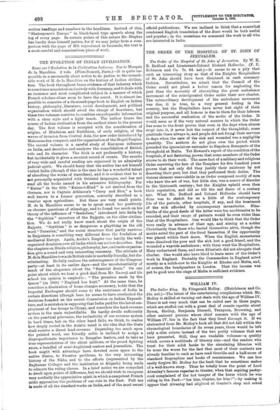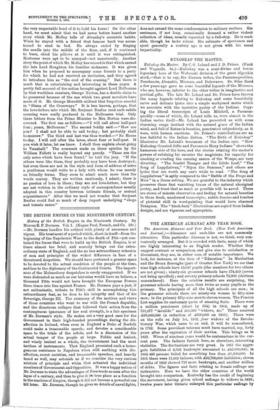WILLIAM IV.
The Sailor King. By Fitzgerald Molloy. (Hutchinson and Co. 24s. net.)—The latest of the entertaining compilations which Mr. Molloy is skilled at turning out deals with the age of William IV. There is not very much that can be called new in these pages, which are stuffed out with a great deal of erambe repetita about Byron, Shelley, Benjamin Disraeli, Tennyson, Browning, and other eminent persons whose chief concern with the age of William IV. lies in the fact that they lived through it. If we abstracted from Mr. Molloy's book all that did not fall within the chronological boundaries of its seven years, there would be left only a slim octavo instead of the two portly volumes that are here presented. Still, they are readable volumes—a quality which covers a multitude of literary sins—and the readers who trust for their solid books to the circulating libraries will be none the worse for the fact that most of their contents are already familiar to such as have read Greville and a half-score of standard biographies and books of reminiscence. We can less easily forgive Mr. Molloy for the hash that he sometimes makes of a well-known story. Thus he totally loses the point of Lord Idvanlers famous repartee to Gunter, when that aspiring pastry- cook complained of the hot temper of the horse which he was riding in the Park—" Ice him, Gunter, ice him !"—by making it appear that Alvanley had alighted at Gunter's shop and asked the very respectable head of it to hold his horse ! On the other hand, we must admit that we had never before heard another story which Mr. Molloy tells of Alvanley's eccentric habits. When he stayed with a friend that famous buck was accus- tomed to read in bed. He always ended by flinging the candle into the middle of the floor, and, if it continued to burn, shied his pillows at it until it was extinguished. Hostesses were apt to be annoyed—not unnaturally. Another story the point of which Mr. Molloy has missed is that which earned the late Lord Houghton his familiar nickname. It was given him when he proposed to accompany some friends to a party for which he had not received an invitation, and they agreed to introduce him as "the cool of the evening." But there is much that is entertaining and interesting in these pages. A pretty full account of the action brought against Lord Melbourne by that worthless creature, George Norton, has a double claim to be preserved because of the use which two great novelists have made of it. Mr. George Meredith utilised that forgotten scandal in "Diana of the Crossways." It is less known, perhaps, that the love-letters into which Mr. Serjea.nt Buzfuz read such subtle meaning were really produced in the Melbourne trial. Only three letters from the Prime Minister to Mrs. Norton were dis- covered. The first ran as follows :—" I will call about half-past four ; yours, Melbourne." The second boldly said:—" How are you? I shall not be able to call to-day; but probably shall to-morrow." The third and last was thus worded:—" No House to-day. I will call after the levee, about four or half-past. If you wish it later, let me know. I shall then explain about going to " The comment made on these epistles by Sir William Follett is really beyond any parody. "These are the only notes which have been found," he told the jury. "If the others were like them, they probably may have been destroyed; but even these are not in the style and form of address of notes a gentleman would write to a lady with whom he was merely on friendly terms. They seem to admit much more than the words convey. They are written cautiously, I admit; there is no passion of love in them ; they are not love-letters, but they are not written in the ordinary style of correspondence usually adopted in this country between intimate friends, or mutual acquaintances." After this we need not wonder that Serjeant Buzfuz could find so much of deep import underlying "chops and tomato sauce."



























































 Previous page
Previous page